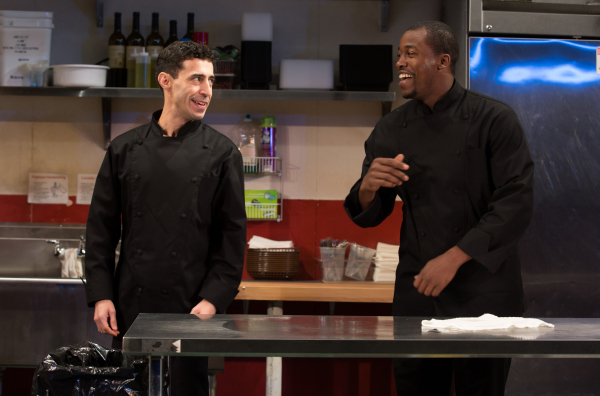My Mañana Comes

(© Matthew Murphy)
Next to the proscenium, there is no arena with which theater professionals are more familiar than a restaurant's back of house. And as playwright Elizabeth Irwin humbly illustrates in The Playwrights Realm's My Mañana Comes, the political, social, and emotional threads that bind and often strangle the members of the food-service industry are more intricately layered than a tiramisu.
Irwin lays us down in the well-worn kitchen of an upscale restaurant on Madison Avenue (designed with expert detail by Wilson Chin), and holds her four characters captive in this confined space for the duration of the 95-minute play. As the restaurant takes on an increasing familiarity, we find Chay Yew's concise direction shrewdly captures the sharp rhythms of kitchen life — the rhythms that keep lemons sliced, bread baskets filled, and workers irrevocably entangled in one another's lives, for better or worse.
The back-of-house "family" of busser/runners Irwin follows through a slow New York summer is composed of two illegal Mexican immigrants, Jorge and Pepe; a third-generation Mexican-American from Brooklyn, Whalid; and an African-American from Harlem named Peter. While all four would fall under the broad "minority" umbrella for the sake of political polling, Irwin successfully delineates the perspectives shaped by each of her characters' complex cultural backgrounds. However, she keeps these cultural distinctions as subtle shadows underlying four unique individuals, each with his own compelling tale and personal approach to surviving (and potentially escaping) less-than-minimum-wage life in urban America.
Irwin takes a boning knife to the stereotyped class of Mexican busboys via Jorge and Pepe, a pair of faces we can attach to terms like "amnesty" and "border security" that are angrily debated among Republicans and Democrats in Congress. Jorge, played with a quiet intensity by José Joaquín Pérez, has been in America for nearly four years. He lives a tight-lipped life of near-austerity in order to support his wife and children that he left behind in Mexico, and to hoard enough away to one day return to his family with a small fortune. Meanwhile, Pepe, portrayed by Reza Salazar with an eager innocence, arrived only three months ago with a much more immediate vision of his "mañana," throwing away money on stylish shoes, alcohol, and nights out on the town.
While Whalid (a charismatic Brian Quijada) shares Jorge and Pepe's Mexican heritage, the generations separating him from his motherland have put him in a cultural camp closer to Peter. Whaild, however, is the only one of the four busboys with career aspirations, describing plans to become a certified EMT. Peter, played by a commanding Jason Bowen, professes to be satisfied with his role as the de facto patriarch of the kitchen, fully aware that his managerial skills far surpass his current position. Though his dreams are reserved for his daughter, who he imagines becoming a successful restaurant owner. He shares this private dream in a soliloquy, as do his fellow busboys — the one heavy-handed aspect of Irwin's text. Yet the crude device offers each man an informative turn in the spotlight to share the intimate details that they would otherwise have kept close to the vest.
The men move in unison like a well-oiled machine in a perpetual groundhog day, without even shifts in daylight or weather pattern infiltrating the fluorescently lit space (lighting design by Nicole Pearce). But through this medium of perfect convergence, Irwin jarringly exposes their sharpest point of divergence when an exploitative manager uses his upper hand on his financially vulnerable employees to put their livelihoods at risk. As each man reacts in accordance with his own vision of "mañana" and the sacrifices required to get there, Irwin leaves us with a surprisingly complex taste of the American Dream — a concept whose idealized aroma all too often overpowers its more subtle contours.










